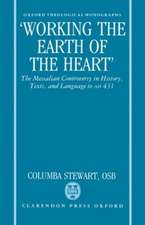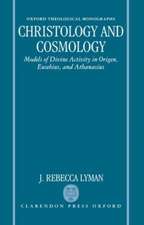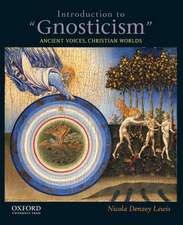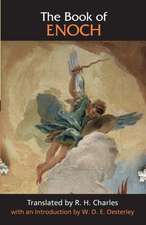Social Justice and the Legitimacy of Slavery: The Role of Philosophical Asceticism from Ancient Judaism to Late Antiquity: Oxford Early Christian Studies
Autor Ilaria L.E. Ramellien Limba Engleză Hardback – 24 noi 2016
Din seria Oxford Early Christian Studies
- 20%
 Preț: 706.02 lei
Preț: 706.02 lei - 17%
 Preț: 582.40 lei
Preț: 582.40 lei - 30%
 Preț: 504.66 lei
Preț: 504.66 lei - 28%
 Preț: 437.72 lei
Preț: 437.72 lei - 17%
 Preț: 582.12 lei
Preț: 582.12 lei - 19%
 Preț: 497.45 lei
Preț: 497.45 lei - 30%
 Preț: 491.67 lei
Preț: 491.67 lei - 25%
 Preț: 568.80 lei
Preț: 568.80 lei - 30%
 Preț: 627.90 lei
Preț: 627.90 lei - 17%
 Preț: 581.27 lei
Preț: 581.27 lei - 12%
 Preț: 616.72 lei
Preț: 616.72 lei - 27%
 Preț: 573.73 lei
Preț: 573.73 lei - 30%
 Preț: 500.48 lei
Preț: 500.48 lei - 30%
 Preț: 542.84 lei
Preț: 542.84 lei - 30%
 Preț: 528.78 lei
Preț: 528.78 lei - 18%
 Preț: 252.05 lei
Preț: 252.05 lei - 26%
 Preț: 517.83 lei
Preț: 517.83 lei - 26%
 Preț: 598.30 lei
Preț: 598.30 lei - 30%
 Preț: 820.42 lei
Preț: 820.42 lei - 34%
 Preț: 1036.50 lei
Preț: 1036.50 lei - 30%
 Preț: 1107.11 lei
Preț: 1107.11 lei - 22%
 Preț: 361.61 lei
Preț: 361.61 lei - 34%
 Preț: 1327.96 lei
Preț: 1327.96 lei - 9%
 Preț: 255.03 lei
Preț: 255.03 lei - 34%
 Preț: 1123.50 lei
Preț: 1123.50 lei - 34%
 Preț: 845.94 lei
Preț: 845.94 lei - 14%
 Preț: 449.09 lei
Preț: 449.09 lei - 34%
 Preț: 1195.96 lei
Preț: 1195.96 lei - 22%
 Preț: 391.93 lei
Preț: 391.93 lei - 34%
 Preț: 1033.77 lei
Preț: 1033.77 lei - 34%
 Preț: 1255.62 lei
Preț: 1255.62 lei - 34%
 Preț: 819.81 lei
Preț: 819.81 lei - 19%
 Preț: 293.42 lei
Preț: 293.42 lei - 34%
 Preț: 1761.02 lei
Preț: 1761.02 lei - 34%
 Preț: 1725.86 lei
Preț: 1725.86 lei - 30%
 Preț: 947.60 lei
Preț: 947.60 lei - 34%
 Preț: 888.89 lei
Preț: 888.89 lei - 30%
 Preț: 1006.79 lei
Preț: 1006.79 lei - 30%
 Preț: 835.47 lei
Preț: 835.47 lei - 30%
 Preț: 1415.68 lei
Preț: 1415.68 lei - 34%
 Preț: 1199.53 lei
Preț: 1199.53 lei - 34%
 Preț: 756.41 lei
Preț: 756.41 lei - 34%
 Preț: 1107.76 lei
Preț: 1107.76 lei - 34%
 Preț: 872.81 lei
Preț: 872.81 lei - 34%
 Preț: 1446.26 lei
Preț: 1446.26 lei - 28%
 Preț: 338.52 lei
Preț: 338.52 lei - 34%
 Preț: 2061.53 lei
Preț: 2061.53 lei - 31%
 Preț: 1036.54 lei
Preț: 1036.54 lei - 34%
 Preț: 890.06 lei
Preț: 890.06 lei
Preț: 687.48 lei
Preț vechi: 986.54 lei
-30% Nou
Puncte Express: 1031
Preț estimativ în valută:
131.55€ • 137.72$ • 108.85£
131.55€ • 137.72$ • 108.85£
Carte tipărită la comandă
Livrare economică 25-31 martie
Preluare comenzi: 021 569.72.76
Specificații
ISBN-13: 9780198777274
ISBN-10: 0198777272
Pagini: 310
Dimensiuni: 162 x 240 x 23 mm
Greutate: 0.6 kg
Editura: OUP OXFORD
Colecția OUP Oxford
Seria Oxford Early Christian Studies
Locul publicării:Oxford, United Kingdom
ISBN-10: 0198777272
Pagini: 310
Dimensiuni: 162 x 240 x 23 mm
Greutate: 0.6 kg
Editura: OUP OXFORD
Colecția OUP Oxford
Seria Oxford Early Christian Studies
Locul publicării:Oxford, United Kingdom
Recenzii
Ramelli pursues fascinating historical work... This is an effective and illuminating lens through which to regard this broad range of material, as it enables Ramelli to compare the real social impact of diverse ancient philosophical, theological, and ethical positions. Surveying this vast tradition with remarkable agility and acumen... Ramelli's strategy is illuminating and refreshing.
This volume is a forceful and epistemologically rigorous part of the debate between slavery and Christianity, embracing a spectrum of points of view that are particularly rich and interesting ... this is an extremely important study, marked with a very appropriate epistemology. The conclusions would interest a wide spectrum of readers from the philosophical sphere to that of Jewish studies, from spirituality to patristics. The books is well written and ... a very effective exhibition of how patristic thought was capable of judging the culture in which it was immersed.
The book impresses with its scholarship; anyone who is interested in material for slavery criticism will find here plenty thereof. The fact that asceticism and slave ownership were not easily compatible, as the author points out, is not an absurd notion. Ramelli succeeds in showing that asceticism and the advocacy of social justice ... went hand in hand ... This book, so rich in research into a vast array of texts, will be very helpful for further discussion of slavery in antiquity.
The perspective [Ramelli] brings into the fray of writing the history of ancient slavery is original and welcome. It is recommended for those engaged with the topic of slavery in antiquity and late antiquity. It has very important contributions to said topic.
With this book Ramelli presents a wide-ranging, well-written and overall very convincing contribution to our understanding of slavery in the ancient world.
This sharply-focused monograph is a contribution to the recent advances in the scholarship concerning the understanding of slavery in the ancient world. ... [It] is predominantly a study of how slavery was variously discussed by pagans, Jewish and Christian writers, though its final chapters consider the previously neglected topic of how in the fourth and fifth century Christian ascetics, strongly influenced by Origen, renounced the practice of slave-ownership seen as a form of injustice.... Ramelli is concerned with a philosophical and ascetic tradition that runs from Plato via Origen to the Cappadocians and, above all, to Gregory of Nyssa.
An exact and well-organised work...[Ramelli] shows perfect mastery of all ancient sources, in matter of philology as well as of ancient languages and contents... Readers will realise the accuracy of Ramelli's research method... Ramelli demonstrates, in this case as in all other cases, her exceptional professional prowess; she has achieved the treatment of such difficult questions using the lens of a classical scholar.
Ramelli's contribution offers an important and distinct link between ascetic practice and the social results of that practice...Ramelli is to be commended for a careful, thoughtful, and accurate analysis of the previously understudied links between ascetic life, social justice in general, and the emancipation of slaves in particular, not to mention the significant contribution to the study of Gregory of Nyssa. Detailed in its exploration of the primary texts and the social and historical contexts, Ramelli's beautifully written research will assuredly enrich future academic conversations about asceticism, social ethics, and the contributions and results of its practice.
In this learned and wide-ranging book, Ramelli documents with an impeccable mastery of the relevant texts composed in Hebrew, Greek, Latin, and Syriac the philosophical and theological arguments on slavery from the Bible down through late classical antiquity...The enormous bibliography testifies to her command of the secondary literature and provides a guide for following up the various topics. Ramelli's book will be indispensable to anyone interested in ancient views of slavery and Christian and non-Christian attitudes toward wealth and property in the ancient Greco-Roman world.
This important study addresses the connection that obtained in antiquity between philosophical asceticism and social justice...it ambitiously but successfully ranges over pagan philosophy from Socrates and the Sophists to Proclus; ancient Judaism; the New Testament, and Greek, Latin, and Syriac patristic writers...For the quality of its scholarship, the range of material it surveys, and its spotlight on the ease with which we contrive to normalise and justify the indefensible, it should be widely read.
Ilaria Ramelli fills with Social Justice an important research gap in the field of ancient slavery: namely, a comprehensive investigation of the influence of asceticism on the philosophy and theology of slavery... That in these circles philosophical asceticism was predominant and connected with the condemnation of social injustice is the great discovery contributed by Social Justice.
Ramelli contributes a helpful study of connections between philosophical asceticism and the advocacy of social justice, especially as exemplified in reservations about or repudiation of slaveholding. Sweeping in its scope, Social Justice and the Legitimacy of Slavery moves historically from the Sophists and texts from the Hebrew Bible to monasticism and other late ancient ascetic practices, with particular emphasis given to the remarkable Gregory Nyssen and his family ... [readers] will find much to commend in Ramelli's ambitious volume.
Linking classical and late antique philosophy, literature, and theology...[Ramelli's] reading of Gregory [of Nyssa] pays attention not only to the breadth of his corpus-something missing from earlier scholarship-but to his ideas in their intellectual milieu...This is as interesting book. It increases understanding of slavery in the late Roman Empire and early Byzantine Empire, how Gregory of Nyssa constructed his theological claims, the connections between classical thought and Christian theology, and the influence of Origen. That is a solid contribution by any standard.
This book's central theme is the relation between asceticism...and the rejection of slavery and social injustice... [It] provides rich documentation for the articulation of ideas from classical antiquity to ancient and late antique Judaism and all the way to the Christian thinkers of the fifth century. This approach of wide chronological scope, that deliberately bridges the gap between classical and late antiquity, and between pagan, Jewish, and Christian writers, is the hallmark of the scholarship of Ilaria Ramelli, who is widely recognised for her many excellent publications in this vein.
The book offers a fascinating overview, in full breadth and depth, of the ancient positions on slavery and the criticism of property, and deserves the closest attention... Nobody should treat any of these issues in the future without resorting to this monograph. The ancient thought of slavery in all its ramifications will never be found in a more compact or complete investigation than in this work. Moreover, Ramelli analyses many authors whose views in these matters are usually overlooked. Highly successful are her remarks on Patristic authorities who rejected Aristotle's justification of slavery through theologico-philosophical arguments... Ramelli assesses this substantial body of sources with superior command, and can thus point out very subtle lines of connection between various Patristic positions.
This monograph, written by an expert in church history, is a valuable contribution to the discussion of slavery in ancient Judaism and Christianity ... The author succeeds in linking the antislavery argument to asceticism with its acceptance of poverty and humility ... The book can be highly recommended to scholars and students.
[Social Justice and the Legitimacy of Slavery] provides rich documentation for the articulation of ideas about slavery from Classical antiquity, through ancient and late antique Judaism, and all the way to the Christian thinkers of the fifth century. This approach of wide chronological scope, that deliberately bridges the gap between Classical and Late Antiquity, and between pagan, Jewish and Christian writers, is the hallmark of the scholarship of Ilaria Ramelli, who is widely recognised for her many publications in this vein.
This volume is a forceful and epistemologically rigorous part of the debate between slavery and Christianity, embracing a spectrum of points of view that are particularly rich and interesting ... this is an extremely important study, marked with a very appropriate epistemology. The conclusions would interest a wide spectrum of readers from the philosophical sphere to that of Jewish studies, from spirituality to patristics. The books is well written and ... a very effective exhibition of how patristic thought was capable of judging the culture in which it was immersed.
The book impresses with its scholarship; anyone who is interested in material for slavery criticism will find here plenty thereof. The fact that asceticism and slave ownership were not easily compatible, as the author points out, is not an absurd notion. Ramelli succeeds in showing that asceticism and the advocacy of social justice ... went hand in hand ... This book, so rich in research into a vast array of texts, will be very helpful for further discussion of slavery in antiquity.
The perspective [Ramelli] brings into the fray of writing the history of ancient slavery is original and welcome. It is recommended for those engaged with the topic of slavery in antiquity and late antiquity. It has very important contributions to said topic.
With this book Ramelli presents a wide-ranging, well-written and overall very convincing contribution to our understanding of slavery in the ancient world.
This sharply-focused monograph is a contribution to the recent advances in the scholarship concerning the understanding of slavery in the ancient world. ... [It] is predominantly a study of how slavery was variously discussed by pagans, Jewish and Christian writers, though its final chapters consider the previously neglected topic of how in the fourth and fifth century Christian ascetics, strongly influenced by Origen, renounced the practice of slave-ownership seen as a form of injustice.... Ramelli is concerned with a philosophical and ascetic tradition that runs from Plato via Origen to the Cappadocians and, above all, to Gregory of Nyssa.
An exact and well-organised work...[Ramelli] shows perfect mastery of all ancient sources, in matter of philology as well as of ancient languages and contents... Readers will realise the accuracy of Ramelli's research method... Ramelli demonstrates, in this case as in all other cases, her exceptional professional prowess; she has achieved the treatment of such difficult questions using the lens of a classical scholar.
Ramelli's contribution offers an important and distinct link between ascetic practice and the social results of that practice...Ramelli is to be commended for a careful, thoughtful, and accurate analysis of the previously understudied links between ascetic life, social justice in general, and the emancipation of slaves in particular, not to mention the significant contribution to the study of Gregory of Nyssa. Detailed in its exploration of the primary texts and the social and historical contexts, Ramelli's beautifully written research will assuredly enrich future academic conversations about asceticism, social ethics, and the contributions and results of its practice.
In this learned and wide-ranging book, Ramelli documents with an impeccable mastery of the relevant texts composed in Hebrew, Greek, Latin, and Syriac the philosophical and theological arguments on slavery from the Bible down through late classical antiquity...The enormous bibliography testifies to her command of the secondary literature and provides a guide for following up the various topics. Ramelli's book will be indispensable to anyone interested in ancient views of slavery and Christian and non-Christian attitudes toward wealth and property in the ancient Greco-Roman world.
This important study addresses the connection that obtained in antiquity between philosophical asceticism and social justice...it ambitiously but successfully ranges over pagan philosophy from Socrates and the Sophists to Proclus; ancient Judaism; the New Testament, and Greek, Latin, and Syriac patristic writers...For the quality of its scholarship, the range of material it surveys, and its spotlight on the ease with which we contrive to normalise and justify the indefensible, it should be widely read.
Ilaria Ramelli fills with Social Justice an important research gap in the field of ancient slavery: namely, a comprehensive investigation of the influence of asceticism on the philosophy and theology of slavery... That in these circles philosophical asceticism was predominant and connected with the condemnation of social injustice is the great discovery contributed by Social Justice.
Ramelli contributes a helpful study of connections between philosophical asceticism and the advocacy of social justice, especially as exemplified in reservations about or repudiation of slaveholding. Sweeping in its scope, Social Justice and the Legitimacy of Slavery moves historically from the Sophists and texts from the Hebrew Bible to monasticism and other late ancient ascetic practices, with particular emphasis given to the remarkable Gregory Nyssen and his family ... [readers] will find much to commend in Ramelli's ambitious volume.
Linking classical and late antique philosophy, literature, and theology...[Ramelli's] reading of Gregory [of Nyssa] pays attention not only to the breadth of his corpus-something missing from earlier scholarship-but to his ideas in their intellectual milieu...This is as interesting book. It increases understanding of slavery in the late Roman Empire and early Byzantine Empire, how Gregory of Nyssa constructed his theological claims, the connections between classical thought and Christian theology, and the influence of Origen. That is a solid contribution by any standard.
This book's central theme is the relation between asceticism...and the rejection of slavery and social injustice... [It] provides rich documentation for the articulation of ideas from classical antiquity to ancient and late antique Judaism and all the way to the Christian thinkers of the fifth century. This approach of wide chronological scope, that deliberately bridges the gap between classical and late antiquity, and between pagan, Jewish, and Christian writers, is the hallmark of the scholarship of Ilaria Ramelli, who is widely recognised for her many excellent publications in this vein.
The book offers a fascinating overview, in full breadth and depth, of the ancient positions on slavery and the criticism of property, and deserves the closest attention... Nobody should treat any of these issues in the future without resorting to this monograph. The ancient thought of slavery in all its ramifications will never be found in a more compact or complete investigation than in this work. Moreover, Ramelli analyses many authors whose views in these matters are usually overlooked. Highly successful are her remarks on Patristic authorities who rejected Aristotle's justification of slavery through theologico-philosophical arguments... Ramelli assesses this substantial body of sources with superior command, and can thus point out very subtle lines of connection between various Patristic positions.
This monograph, written by an expert in church history, is a valuable contribution to the discussion of slavery in ancient Judaism and Christianity ... The author succeeds in linking the antislavery argument to asceticism with its acceptance of poverty and humility ... The book can be highly recommended to scholars and students.
[Social Justice and the Legitimacy of Slavery] provides rich documentation for the articulation of ideas about slavery from Classical antiquity, through ancient and late antique Judaism, and all the way to the Christian thinkers of the fifth century. This approach of wide chronological scope, that deliberately bridges the gap between Classical and Late Antiquity, and between pagan, Jewish and Christian writers, is the hallmark of the scholarship of Ilaria Ramelli, who is widely recognised for her many publications in this vein.
Notă biografică
Ilaria L. E. Ramelli is Professor of Theology and K. Britt endowed Chair at the Graduate School of Theology, SHMS, Thomas Aquinas University (Angelicum), the Director of International Research Projects, Senior Visiting Professor of Church History at Columbia University, Senior Research Fellow in Religion at Erfurt University, Senior Fellow at Princeton University, and Visiting Research Fellow at the University of Oxford. Her publications include, Evagrius's Kephalaia Gnostika: A New Translation of the Unreformed Text from the Syriac (SBL, 2015), The Christian Doctrine of Apokatastasis (Brill, 2013), Hierocles the Stoic: Elements of Ethics, Fragments, and Excerpts (SBL, 2009), and Bardaisan of Edessa: A Reassessment of the Evidence and a New Interpretation (Gorgias Press, 2009).















